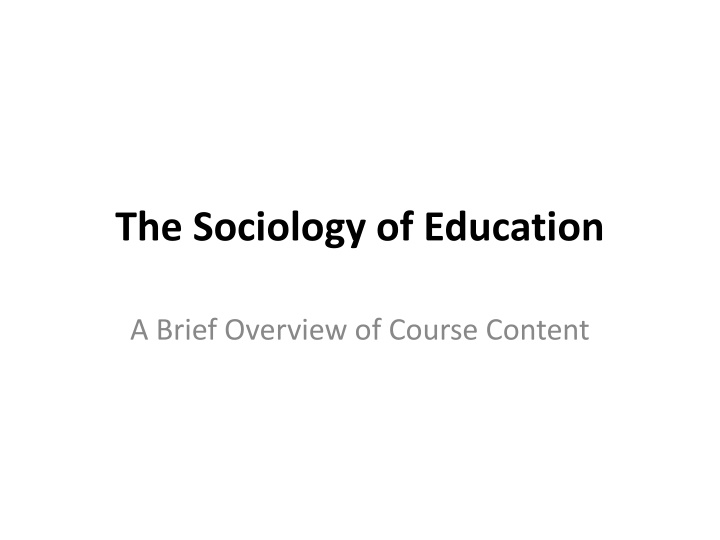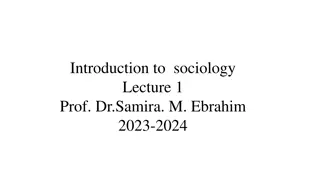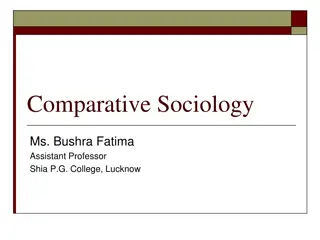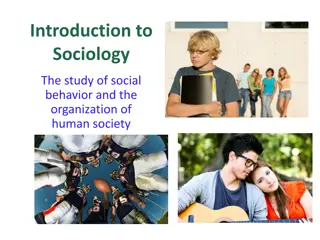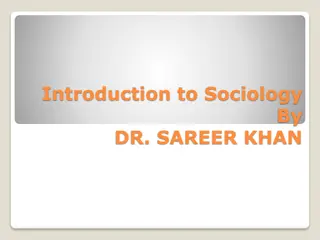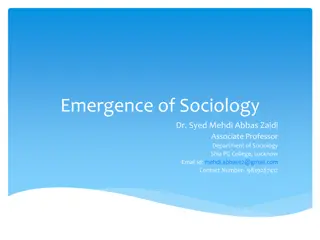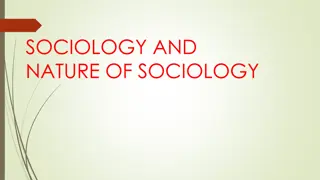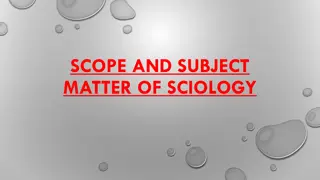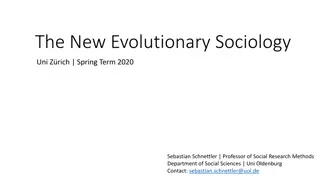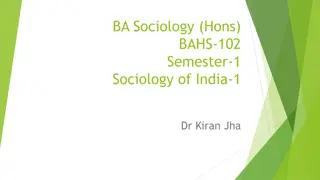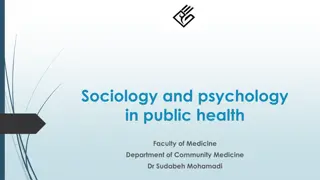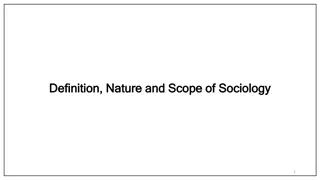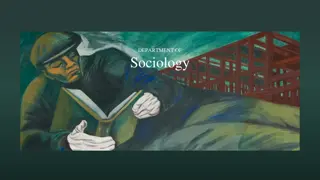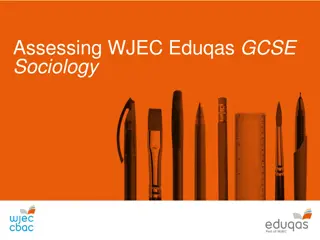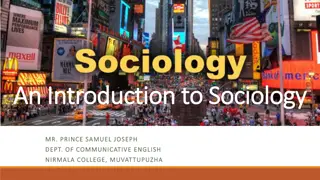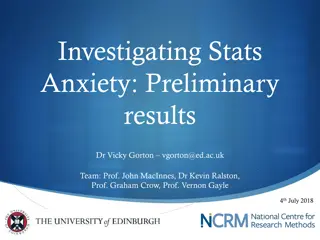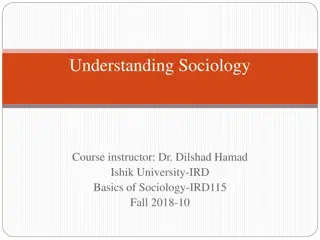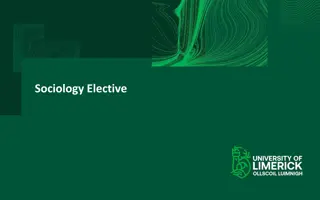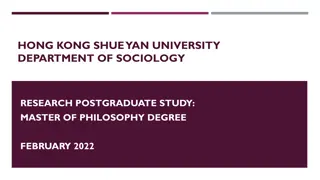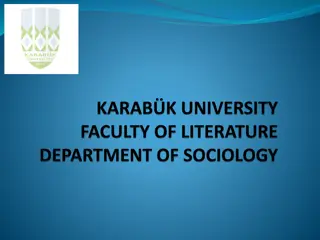Sociology of Education: Role and Perspectives
Explore the role of the education system in society, including its functions, relationships, and effects on social groups. Learn about different perspectives such as Functionalism, Marxism, the New Right, and Postmodernism, and their views on education. Discover how educational policies impact access and equality in education.
Download Presentation

Please find below an Image/Link to download the presentation.
The content on the website is provided AS IS for your information and personal use only. It may not be sold, licensed, or shared on other websites without obtaining consent from the author.If you encounter any issues during the download, it is possible that the publisher has removed the file from their server.
You are allowed to download the files provided on this website for personal or commercial use, subject to the condition that they are used lawfully. All files are the property of their respective owners.
The content on the website is provided AS IS for your information and personal use only. It may not be sold, licensed, or shared on other websites without obtaining consent from the author.
E N D
Presentation Transcript
The Sociology of Education A Brief Overview of Course Content
7191 - Education The role and functions of the education system, including its relationship to the economy and to class structure (the perspectives: functionalism etc.) Differential educational achievement of social groups by social class, gender and ethnicity in contemporary society. Relationships and processes within schools, with particular reference to teacher/pupil relationships, pupil identities and subcultures, the hidden curriculum, and the organisation of teaching and learning. The significance of educational policies, including policies of selection, marketisation and privatisation, and policies to achieve greater equality of opportunity or outcome, for an understanding of the structure, role, impact and experience of and access to education; the impact of globalisation on educational policy.
Perspectives on Education There are 4 Main Perspectives: Functionalism Marxism The New Right Postmodernism You can also use knowledge from these perspectives: Feminism/ Social Democratic/ Liberalism
Functionalism Focuses on the positive functions performed by the education system. There are four positive functions that education performs Creating social solidarity (value consensus) Teaching skills necessary for work Bridge between home and school Role Allocation and meritocracy
Marxism Traditional Marxists see the education system as working in the interests of ruling class elites. The education system performs three functions for these elites: Reproduces class inequality. Legitimates class inequality. The Correspondence Principle School works in the interests of capitalist employers
The New Right Created an education market - Schools were run like businesses competing with each other for pupils and parents were given choice. This required league league tables Schools should teach subjects that prepare pupils for work, Hence education should be aimed at supporting economic growth. Hence: New Vocationalism! The state was to provide a framework in order to ensure that schools were all teaching the same thing and transmitting the same shared values hence the National Curriculum
Postmodernism Not a major perspective on education. Use to criticise the relevance of the previous three perspectives. A one size fits all education system does not fit with a post-modern society Education needs to be more flexible and targeted to individuals.
In School Processes Make sure you explain the difference between Interactionism and Structural Theories School Ethos and The Hidden Curriculum The School Ethos The Hidden Curriculum Teacher Stereotyping and the halo effect The ideal pupil Labelling and the Self Fulfilling Prophecy Banding, streaming and setting Definitions of banding/ streaming setting Summaries of evidence on the effects of banding etc. Unequal access to classroom knowledge Educational triage Student responses to the experience of schooling: school subcultures Differentiation and Polarisation Pro-School subcultures Anti-school (or counter-school) subcultures = Between pro and anti-school subcultures: a range of responses
Gender and Education There are three main types of question for gender and education achievement, subject choice the trickier question of how gender identities affect experience of schooling and how school affects gender identities. Achievement (why do girls generally do better than boys) In the 1980s boys used outperform girls Today, girls do better than boys by about 8% points at GCSE. There are about 30% more girls in University than boys. Subject Choice (why do they choose different subjects) Subject choice remains heavily gendered Typical boys subjects = computing/ VOCATIONAL especially trades/ engineering Typical girls subjects = dance, sociology, humanities, English, hair and beauty. Experience of Schooling/ Gender Identity Pupils gender identities may influence the way they experience school. Schools may reinforce traditional (hegemonic) and femininity Gender identity varies by social class and ethnicity.
Gender and Education: Out of School/ Home Factors Changes in Employment Rise of the service, decline in manufacturing sector, crisis of masculinity. Changes in the family dual earner households, more female worker role models. LINK TO FAMILY MODULE Changing girls ambitions from marriage and family to career and money (Sue Sharp) Differential socialisation girls socialised to be more passive/ toys related to different subjects (Becky Francis) LINK TO FUNCTIONALISM/ PARSONS. Parental attitudes traditional working class dads may expect boys to not try hard at school. Impact of Feminism equal opportunity policies. Policy changes introduction of coursework in 1988/ scaling back of coursework in 2015.
Gender and In School Factors Teacher Labelling typical boys = disruptive, low expectation, typical girls = studious, high expectations (Jon Abraham) LINK TO INTERACTIONISM, Self-Fulfilling Prophecy Subcultures boys more likely to form counter-school cultures (Willis) LINKS to out of school. Feminisation of teaching increase in female teachers puts boys off Subject counsellors advise boys to choose boys subjects Gendered subject images match traditional gender domains Boys domination of equipment puts girls off practical subjects like PE Traditional masculine identities boys just don t see school as a boy thing Working class boys saw school as queer , middle class work hard but hide this (Mac An Ghail) Hyper-Feminine identities (hair/ make up) clash with the school (Carolyn Jackson) Verbal Abuse boys who study hard get called gay as a term of abuse.
Social Class Differences in Educational Achievement Why do working class kids do worse than middle class kids? Free School Meals to measure, not class! Material Deprivation Hidden costs The cycle of deprivation Selection by mortgage Cultural Deprivation blame the working classes Immediate/ deferred gratification Restricted/ elaborated speech codes Cultural Capital Marxist blame the middle classes Skilled and Disconnected Choosers In-School Processes Labelling, the ideal pupil (Becker) Counter School Culture (Willis) Aspirational culture in school (links to cultural capital)
Ethnicity and Differential Educational Achievement Intro Material Factors differences in income/ class don t explain the difference (poor Chinese kids compared poor white kids) Cultural factors Family structure (single parent households) Parental attitudes (Steve Strand 2007) Language differences (linguistic deprivation) Black anti-school masculine street cultures (Tony Sewell) In-School Processes Teacher racism/ labelling (Gilborn) Subcultures and anti-school attitudes (Tony Sewell) Subcultures as a means of resisting racism (Mac An Ghail). Banding and Streaming/ Educational Triage Ethnocentric Curriculum Experiences of institutional racism and from other pupils (Crozier) Also racism in admissions at Oxford University Chinese/ Indian kids do best African-Caribbean, Gypsy Roma worst.
Education Policies Key Policies 1944 The Tripartite System 1965 Comprehensivisation 1988 New Right - Education Act Marketisation 1997 New Labour Academies, Expansion of HE, Sure Start, EMA. 2010 Coalition/ New Right Forced Adacademisation, Free Schools, Funding Cuts, Pupil Premium, and MORE STATE GRAMMARS. Compenstory Education E.G. EMA. Vocationalism e.g, Apprenticeships.
Education Policies Key Questions To what extent have policies raised achievement? To what extent have policies improved equality of opportunity? How have policies changed the way schools select pupils and what are the consequences (apply the perspectives) In what ways has education becoming more privatised and what are the consequences (apply the perspectives)? What is the relationship between globalisation and education policy?
